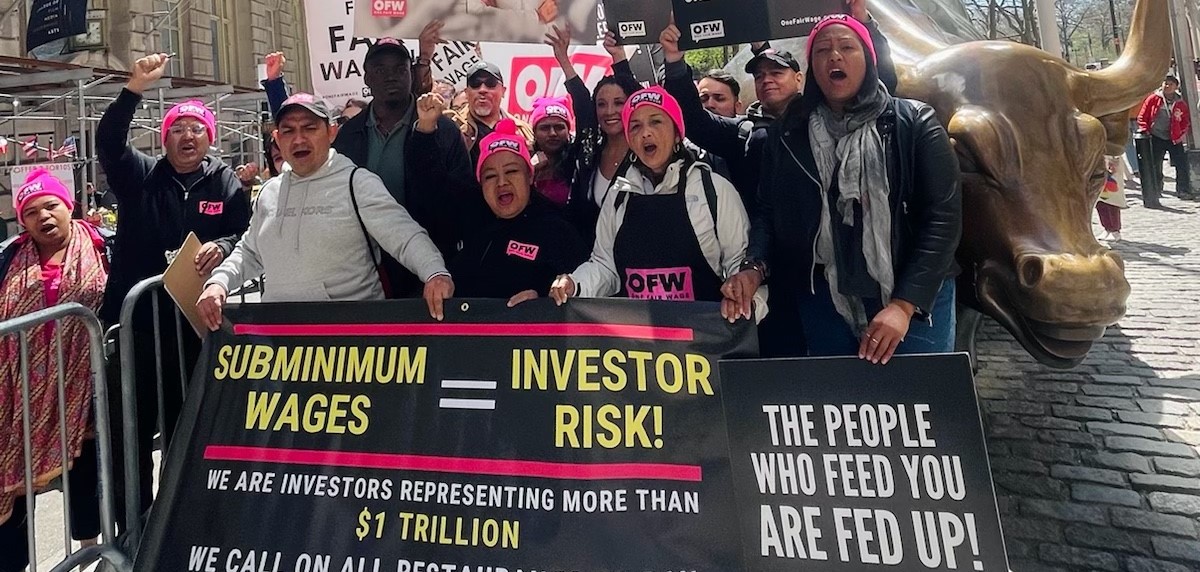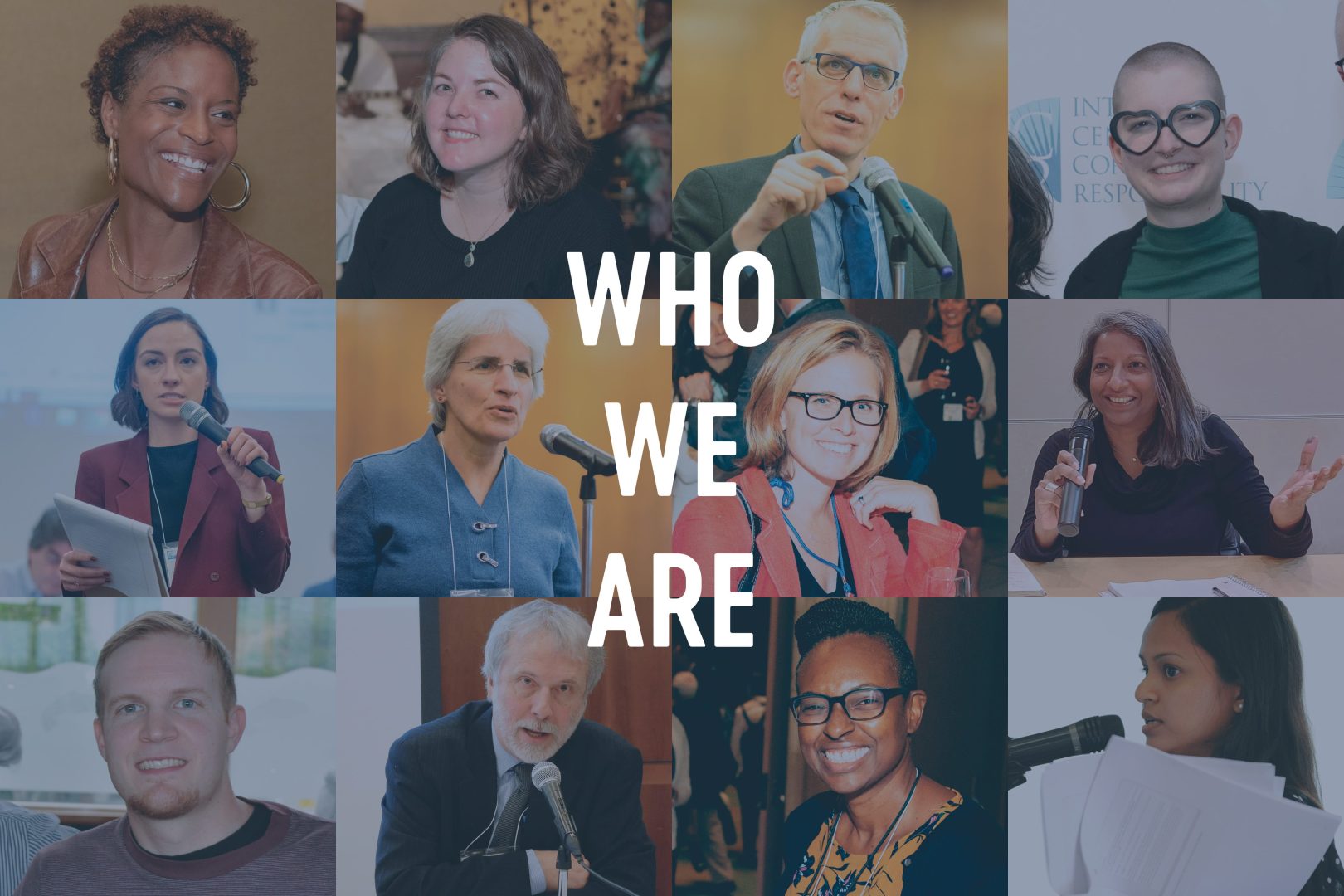Investors Call on U.S. Companies to Take Steps Toward the Payment of a Living Wage

Statement endorsed by 136 investors representing US$4.5T in assets cites workforce investments as good for business and key to addressing systemic societal and economic risks.
NEW YORK, NY, WEDNESDAY, NOVEMBER 15 2023 – The Interfaith Center on Corporate Responsibility (ICCR) today released a statement signed by 136 institutional investors calling on U.S. companies, particularly those in low-wage sectors such as the retail, restaurant, hospitality, and gig sectors, to pay a Living Wage to their workers.
The investors argue that paying a sub-living wage to workers exposes companies to significant financial and reputational risks and view paying a living wage as critical to helping close the racial, gender, and income divides causing so much social and economic unrest in the U.S.
The Global Living Wage Coalition defines a living wage as:
The remuneration received for a standard workweek by a worker in a particular place sufficient to afford a decent standard of living for the worker and her or his family. Elements of a decent standard of living include food, water, housing, education, health care, transportation, clothing, and other essential needs including provision for unexpected events.
Moreover, the concept of a living wage as a human right is recognized in multiple international treaties and frameworks such as the Universal Declaration of Human Rights, the Preamble of the International Labour Organization (ILO) Constitution, and the UN Sustainable Development Goals (SDGs).
“While most U.S. companies are focused on how this will impact their bottom lines short term, research suggests that paying a living wage is an ‘insurance policy’ that can protect businesses over the long term,” said Ivan Frishberg, Chief Sustainability Officer at Amalgamated Bank. “Productivity, motivation, and loyalty all increase when workers don’t need multiple jobs just to support their family’s basic needs. Conversely, we are seeing how a failure to pay workers adequate wages can play out in real-time for companies in picket lines across the country. Disruptions from work stoppages, high turnover, and employee unrest, not to mention reputational damage when these things hit the press can all be very costly for companies.”
“We believe that investing in employees through the payment of a living wage is a crucial positive step to deliver a clear message to employees that they are valued,” said Angeli Benham of Legal & General Investment Management (LGIM). “For long-term investors, such as ourselves, we view paying a living wage as emphasizing the positive culture of a company, and its Board. Further, it is also an indicator that reported profits are more likely to be sustainable over the longer term because the company is actively addressing its human capital risks and is safeguarding against future regulatory risks that may otherwise negatively impact its business activities and bottom line.”
Estimates show that in 2022, 51% of all the workers at Russell 1000 companies, who in total made up about 15% of the employed population in the U.S. in 2021, were not earning a family-sustaining living wage. MIT’s Living Wage Calculator estimates that “a single mother with two children earning the federal minimum wage of $7.25 per hour needs to work 252 hours per week, the equivalent of almost six full-time minimum-wage jobs, to make a living wage. Hourly workers in traditionally low-wage sectors are most likely to receive sub-living wages and women and BIPOC workers are especially vulnerable.
"Workers across the U.S. are struggling to make ends meet,” said Ben Zucker of Step Up Louisiana which organizes for economic and education justice in the South and supports Dollar Store workers. “From rent to the cost of healthcare to food, childcare, and transportation, the cost of living continues to go up and up while our wages stay flat. In Louisiana, our minimum wage is $7.25 per hour. No one can survive on that. We need the minimum wage to be a living wage to support workers and families. Workers at massive corporations shouldn't have to live paycheck to paycheck and worry about how to take care of their children."
The statement points to evidence that paying a living wage will have broader systemic benefits that will redound to all stakeholders including the estimate that closing the living wage gap worldwide could generate an additional $4.56 trillion every year through increased productivity and spending.
“Widening income and wealth gaps are often-overlooked sources of systemic risk to the financial system and the economy overall,” said Kelly Hirsch, Head of ESG at Vancity Investment Management (VCIM). “As people are increasingly struggling to keep up with higher costs of living, rising inflation, and the effects of climate change, the Vancity Group, one of Canada’s largest private-sector certified living wage employers, sees the first-hand benefits that paying a living wage brings to our workforce and local communities. It increases employee engagement and performance while also inspiring other employers to adopt living wage policies, creating positive ripple effects that benefit and strengthen the overall economy.”
“As a faith-based investor, we are concerned by how company actions may be contributing to the impoverishment of people and systemic injustices. Our investment decisions take into consideration the long-term and systemic implications of corporate policies and practices, and how a company values its workers through wages is an important indicator of a company’s values writ large,” said Caroline Boden of Mercy Investment Services. “We want to know if companies are prioritizing profits and quarterly earnings at the expense of worker well-being, or if they are compensating their workers fairly, with the understanding that investing in their workers will translate to healthier families and communities and an economy that supports all stakeholders.”
The investors say the statement will be used in engagements to advance worker rights as part of ICCR’s Advancing Worker Justice program. Other engagement topics include paid sick leave, protecting workers’ right to organize, and ensuring workplace health and safety.
CONTACT:
Susana McDermott
Director of Communications
Interfaith Center on Corporate Responsibility (ICCR)
201-417-9060 (mobile)
smcdermott@iccr.org
About the Interfaith Center on Corporate Responsibility (ICCR)
The Interfaith Center on Corporate Responsibility (ICCR) is a broad coalition of more than 300 institutional investors collectively representing over $4 trillion in invested capital. ICCR members, a cross-section of faith-based investors, asset managers, pension funds, foundations, and other long-term institutional investors, have over 50 years of experience engaging with companies on environmental, social, and governance (“ESG”) issues that are critical to long-term value creation. ICCR members engage hundreds of corporations annually to foster greater corporate accountability. Visit our website www.iccr.org and follow us on Twitter/X (@iccronline), LinkedIn, and Facebook.







